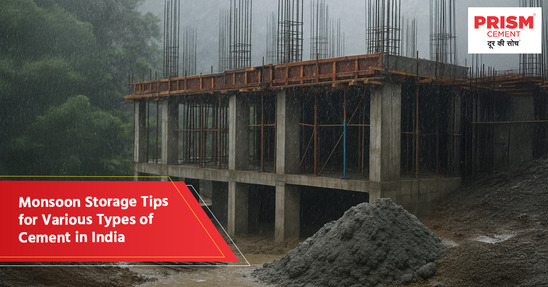
In the bustling world of the cement industry, knowing how to handle cement storage, select the right cement type, and understand the range of cement bags is essential for builders and homeowners alike. From choosing between bags for cement to evaluating cement quality, every decision impacts your project’s longevity. With India offering a variety of types of cement in India, it's crucial to discern the best cement in India for your needs. Proper cement storage ensures moisture protection and maintains strength, while selecting the appropriate cement type optimizes performance.
In this blog, we’ll guide you through choosing the ideal bags for cement, reviewing leading brands, and mastering storage techniques to maintain peak cement quality in the evolving cement industry landscape.
The monsoon season in India can be challenging for the cement industry, especially when it comes to cement storage. The humidity, rainfall, and fluctuating temperatures can negatively impact cement quality, affecting its performance and strength. Proper storage techniques are essential to ensure that cement bags remain in good condition and maintain their effectiveness.
Whether you're storing cement bags at a construction site or in a warehouse, understanding how to store cement during the rainy season can prevent the material from absorbing moisture and forming clumps, which can lead to wastage.
India’s cement industry is vast and offers a wide range of cement types for various applications. Each cement type has its unique characteristics, which can get affected with storage type. Let’s look at some of the most common types of cement in India.
Ordinary Portland Cement (OPC) is the most widely used cement in India. It is the base material for almost all kinds of construction projects. While OPC is a versatile cement type, it is sensitive to moisture and must be stored carefully during the monsoon season. If exposed to excessive moisture, OPC can absorb water, affecting its setting time and strength.
Portland Pozzolana Cement (PPC) is known for its superior durability and resistance to aggressive environments. It is highly preferred for applications like dam construction and marine works. PPC is less susceptible to moisture than OPC but still requires proper storage to maintain its quality. Cement bags containing PPC should be kept dry to ensure the best performance.
Portland Slag Cement (PSC) is a sustainable option, made by blending slag with clinker. It is known for its high strength and durability. Though PSC is more resistant to moisture than OPC, it should still be stored in a dry place during the monsoon season to preserve its chemical properties and performance.
Specialty cements, such as white cement, rapid hardening cement, and sulfate resistant cement, are designed for specific applications. White cement is especially vulnerable to moisture as it can develop stains if exposed to water. Rapid hardening cement needs to be kept in dry conditions to avoid premature setting. These cement types require more careful storage compared to other cements.
During the monsoon season, excessive moisture in the air can lead to the absorption of water by cement bags, which can alter the cement's physical properties. This change in properties can result in improper setting, reduced strength, and ultimately, failure in construction projects. Therefore, cement storage during the monsoon season is critical to ensure that the material remains in good condition and retains its full effectiveness.
Proper cement storage during the monsoon season is crucial to ensure that cement quality is maintained and construction projects are not compromised. With the right precautions, such as using waterproof covers, elevating cement bags, and storing them in a well-ventilated area, you can avoid moisture-related damage.
When choosing the best cement in India, it's essential to consider the local climate and ensure that the cement type you select is suited to the environmental conditions. For instance, Prism Champion All Weather GOLDSHIELD Cement is a great option for areas prone to heavy rainfall, as it offers superior resistance to moisture and dampness, ensuring your cement bags stay in top condition during the monsoon season. Always make sure to follow the right cement storage guidelines to get the most out of cement.
Proper storage is key to maintaining cement quality during the monsoon season. Follow our expert guidelines and keep your cement in perfect condition.
Answer: Proper cement storage during the monsoon season ensures that cement bags do not absorb moisture, which can degrade the quality of the cement, causing issues with setting and strength.
Answer: Ordinary Portland Cement (OPC) is the most vulnerable to moisture as it absorbs water quickly, which can affect its strength and setting time.
Answer: Store cement bags on raised platforms or pallets, and cover them with waterproof materials to keep them dry and protected from rain.
Answer: Yes, moisture can still affect cement quality even if the cement bags are unopened. Excess humidity can degrade the cement inside, leading to clumping and poor performance.
Answer: For monsoon-prone regions, Portland Pozzolana Cement (PPC) like Prism Champion All Weather GOLDSHIELD cement, is ideal due to its superior resistance to moisture and dampness.
Prism Cement a division of Prism Johnson Limited is one of India’s leading integrated Building Materials Company, with a wide range of products from cement, ready-mixed concrete, tiles and bath products.
Prism Johnson Limited is an IMS Certified Company (ISO 9001:2015, ISO 14001:2015, ISO 45001:2018,SA 8000:2014 & ISO 50001:2018). Quality assurance is an integral part of Prism Johnson Limited manufacturing philosophy. The strength and other characteristics are much higher than the BIS requirements. Excellent quality has placed Prism Cement in the premium price segment.
KNOW MORE305, Laxmi Niwas Apartments, Ameerpet,
Hyderabad - 500016, Andhra Pradesh
![]() Tel: +91-40-23400218
Tel: +91-40-23400218
![]() Fax: + 91-40-23402249
Fax: + 91-40-23402249
"Rahejas", Main Avenue, V.P. Road,
Santacruz (W), Mumbai - 400054,
Maharashtra
![]() Tel: +91-40-23400218
Tel: +91-40-23400218
![]() Fax: + 91-40-23402249
Fax: + 91-40-23402249